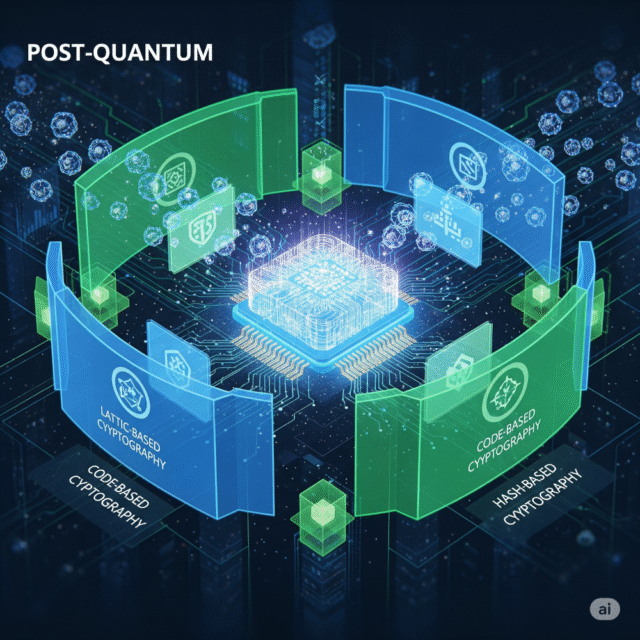
New report warns of looming agentic AI and quantum fraud risks
A new identity fraud report from AU10TIX looks at how fraud is shifting from isolated attempts to adaptive, self-optimizing systems, and the need for early-warning intelligence to reshape the future of fraud prevention amid rapid advances in artificial intelligence and quantum computing.
“Fraud is no longer a static event; it’s a living signal moving through networks and devices,” says Yair Tal, CEO of AU10TIX. “At AU10TIX, we see the daily challenges our customers face as fraud evolves faster than ever. Our mission is to protect them, not just by responding to attacks, but by anticipating them. Our early-warning system helps ensure their businesses stay one step ahead, detecting risk before truth starts to drift.”

IBM and Cisco announce partnership to create a distributed network of fault-tolerant quantum computers
IBM and Cisco have announced plans to work together on a connected network of large-scale, fault-tolerant quantum computers. The collaboration will unite IBM’s progress in quantum hardware with Cisco’s research into quantum networking, creating a system designed to link together multiple advanced quantum machines.
The companies expect this direction to expand quantum computing beyond the limits of individual systems, supported by a planned demonstration of networked quantum computers within five years and further work towards distributed quantum computing in the early 2030s.

Cryptographic debt and quantum readiness [Q&A]
As White House Executive Orders, NIST mandates, and international deadlines accelerate the push toward post-quantum encryption, the clock is ticking for organizations still grappling with cryptographic debt.
We spoke to Dave Krauthamer, co-founder and field CTO at QuSecure, to learn more about emerging threats, compliance mandates, and mitigation frameworks for organizations looking to get ahead of the coming disruption.

Almost half of enterprises not prepared for quantum threats
A new report looks at the state of post-quantum cryptography (PQC) from the perspective of
cybersecurity professionals, finding that 48 percent of organizations aren’t prepared to confront the urgent challenges posed by quantum computing.
The report from Keyfactor, based on a survey of 450 cybersecurity leaders across North America and Europe carried out by Wakefield Research, finds mid-sized organizations are particularly vulnerable, with 56 percent saying they are not ready.

'Circuit compression' technology brings commercial quantum a step closer
Quantum computing is something that we've been covering for a while but commercial implementations always seem to be tantalizingly out of reach.
It could be getting nearer though thanks to work by Classiq Technologies, with Deloitte Tohmatsu Group, and Mitsubishi Chemical Corporation to demonstrate improved circuit compression.

The quantum revolution: Five ways quantum will transform everyday life
Our world is gripped by uncertainty. From economic volatility to the climate crisis, businesses and individuals alike are navigating a landscape marred by unpredictability. As the World Economic Forum warns in its most recent global risk report, our outdated digital infrastructure and subsequent services are struggling to keep pace with the growing demands of the modern world.
As emerging technologies like AI, Blockchain and even 5G hit everyday life like a tidal wave, we need something that can not only help us navigate our way but also handle the waves. Think of it like trying to cross an ocean on a rowboat, without a compass. What we need is a modern cruise ship.

Facing the security challenge of quantum computing [Q&A]
Now that we're beginning to overcome the obstacles to creating a commercially viable quantum computer it's important to consider the security threat that these vastly more powerful machines will pose.
Not least of these is the threat to encryption which puts everyone's online security at risk. We spoke to Nils Gerhardt, chief technology officer and head of product for Utimaco, to explore what a post-quantum future may look like.

Confronting quantum computers' cryptanalysis concerns
The race to successfully build quantum computers is on. With the potential to solve all manner of problems for humanity, players across the globe -- from tech companies to academic institutions to governments -- have been busy investing significant resources into quantum computing initiatives for some years now.
But what are they exactly? A traditional (digital) computer processes zeros and ones, so called bits. These, to a first order approximation, are represented as on/off electrical signals. Quantum computers, on the other hand, leverage quantum mechanics to process information using quantum-bits or qubits, which can represent multiple states simultaneously. And it’s this capability that enables quantum computers to tackle computational tasks that are currently out of the question for classical computers - think factoring large numbers, simulating quantum systems, optimizing complex systems or solving certain types of optimization and machine learning problems.

Preparing for a post-quantum security landscape [Q&A]
As widely available quantum computing draws closer, organizations need to consider the extent to which their supply chain presents risks and start building in post quantum readiness to their risk assessments.
To do this, it's critical for businesses to understand the origin and authenticity of all the components that are in the supply chain (both hardware and software). This is especially true for IoT devices, which rely on systems and subsystems created by multiple partners and vendors bringing their solutions together to make a fully functioning connected product/system.

Quantum computing: The data security conundrum
One of the biggest challenges of digital technology today is around security systems and data. In response to this, sophisticated algorithms have been designed to encrypt data and protect it through frameworks known as symmetric cryptography. While this has proven successful, advancements in quantum computing -- which utilizes quantum mechanics to solve complex problems faster than conventional computers -- could potentially turn data security on its head.
IBM, Microsoft and Google have already turned their attention to quantum computing and, as a result, commercially viable quantum computers are not too far from becoming a reality. In fact the global quantum computing market size in terms of revenue was estimated to be USD 866 Million in 2023 and is poised to reach USD 4,375 Million by 2028, growing at a CAGR of 38.3 percent from 2023 to 2028. This is raising concerns that these computers might pose a threat to current public-key cryptography algorithms and potentially expose sensitive data. As such, data security needs to be a step ahead, with more advanced cryptographic algorithms that minimise potential risks and ensure the safeguarding of data in a quantum computing world.

New resource helps enterprises prepare for post-quantum security
Cybersecurity company Thales is launching a first-of-its-kind Post Quantum Cryptography (PQC) Starter Kit in collaboration with Quantinuum, aimed at supporting enterprises in their transition to a post-quantum era and helping them understand the implications that quantum computing will have on the security of their infrastructure.
While 73 percent of organizations recognize quantum computing poses a threat to traditional cryptography, 61 percent have yet to define a strategy for a post-quantum world.

New collaboration helps organizations defend against AI and quantum risks
One of the key recent concerns for security teams has been developing the ability to adapt to advancements in technology and innovations such as AI and quantum computing.
A new partnership between Accenture and SandboxAQ aims to give organizations the ability to scan all of their files, applications and network traffic to ensure that all of their data -- whether on-premise or hosted via major cloud providers -- is secure even if attackers break through firewalls and network endpoints.

Will Quantum Computing change the way we use encryption?
Today, encryption is a cornerstone of our cybersecurity practices. It protects everything from cell phones and SMS messages to financial transactions and intellectual property.
However, a new challenge in the complex landscape of encryption has recently emerged, thanks to the advancement of quantum computing. What challenges lay ahead? Here is the breakdown:

OneSpan launches quantum-safe storage to secure digital agreements
Recent technology developments related to AI and the rise of quantum computing can put the integrity of digital agreements at risk, potentially leading to data loss, manipulation, identity or asset theft, and legal consequences for an organization.
For this reason OneSpan is launching a new Trust Vault feature for its e-signature solution that helps guarantee the integrity and long-term viability of documents using immutable storage based on blockchain technology.

The quantum leap: Quantum computing breakthroughs to watch
The classical computer has been the bedrock of computing for over 50 years. That’s going to change soon. quantum computing, which was once a concept limited to fringe scientific papers, is now becoming a mainstream topic.
We’re seeing significant breakthroughs in the headlines which are stoking the flames of conjecture. The truth is, that this technology will bring with it much more than hype and opportunities to breathe life into sci-fi creations. In this article, we’re going to dive into some of the milestones of quantum computing, future goals and, of course, the challenges that we still have to overcome.
